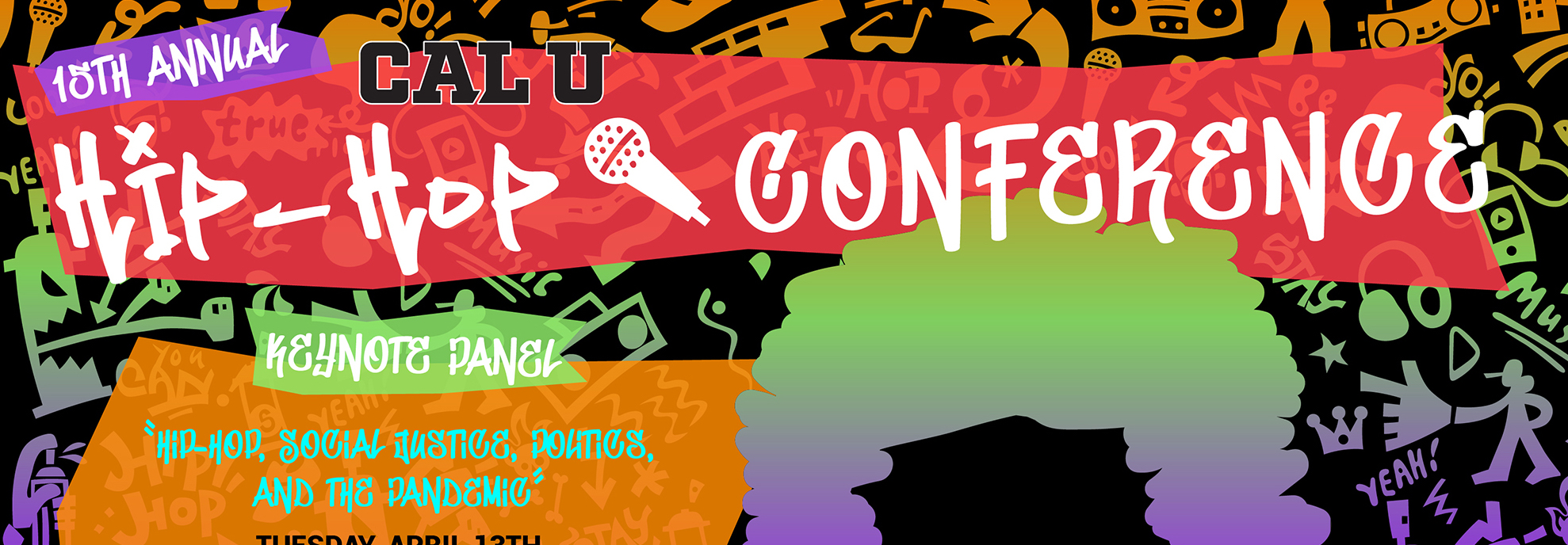The future of the genre, social justice, politics and more are the subjects during Cal U's annual event.

Two evenings of conversation about the role of hip-hop in politics and society, as well as a look at what’s next for the genre, highlighted Cal U’s Hip-hop Conference, in its 15th year at the University.
On April 13, Dr. Cornel West, a philosophy professor known for his classics Race Matters and Democracy Matters, and his memoir, Brother West: Living and Loving Out Loud, joined Jeff Chang, a cultural critic best known for his book Can't Stop Won't Stop: A History of the Hip-Hop Generation.
The two offered their perspectives on “Hip-hop, Social Justice, Politics and the Pandemic,” in a conversation moderated by history professor Dr. Kelton Edmonds, founder and organizer of the Hip-hop Conference, and Dr. Ayanna Walker, director of the Frederick Douglass Institute at Cal U.
“I think artists have the responsibility to represent the world they’re in, and to do that truthfully,” Chang said. “Hip-hop has expanded the number of voices we hear in the mainstream culture, and a lot of what needs to be expressed is not pretty, but needs to be said.”
Edmonds asked the speakers about the current state of politics in light of the Jan. 6 Capitol insurrection and changes to voting laws in Georgia.
“We’re at a crossroads,” Chang said. “We literally have a choice to take it forward to the America we can make together that would be a departure from violence and bloodshed. Or we can make a better machine to oppress people. That’s where we are in the moment. And that’s what we saw Jan. 6, a battle in this fight between forces.”
Citing the #MeToo and #BlackLivesMatter movements, both men discussed the motivation for becoming a social justice ally.
“You have to have deep care and profound concern and love and sensitivity for people,” West said. “Justice is about fairness, but I’m talking about the heart, mind, soul, a fire deep down that won’t allow you to hold your peace. … This is why the arts are important. You can’t reduce the arts to justice. They’re trying to teach us how to be human.”
Added Chang: “Love is a renewable resource, and the arts renew us. Creativity is the source for renewal, the engine that drives all of this. All of these iterations of black freedom, from reggae, soul, jazz, R&B, they are renewable resources and that’s what we need to nurture in ourselves for the long run. Fight for justice with deep love.”
Watch the April 13 presentation on YouTube.
On April 15, MyFavoriteColor, a national recording artist who attended Cal U; Bryon Turman, professor of hip-hop studies at North Carolina A&T; Dr. Jessica Spradley, a sociology instructor at Cal U; and Dr. Wil Boone, professor of Black studies at Winston-Salem State University discussed ““What’s Next for Hip-hop — Artistically and Academically?”
Topics included the rise of female hip-hop artists, whether hip-hop is “high art” or “low art,” whether artists can or should use their platforms to uplift causes and more. The wide-ranging conversation that can be viewed on YouTube.
“It’s interdisciplinary,” Turman said of how music and culture can be found in the classroom. “You can find hip-hop in engineering. It’s in the humanities in the academy … but I think it’s in economics … marketing for sure … psychology, and how hip-hop affects behavior. And where it’s going? It’s going as Black people go.”
“With fame comes a burden,” Spradley said of hip-hop artists. “(But) it’s not in everyone’s lane to be an advocate (for social justice). Everyone doesn’t want to be a social justice warrior.”
Boone spoke to the exploitation vs. liberation argument that surrounds artists such as Cardi B and Meghan Thee Stallion.
“On the one hand … they can create art as they wish — profane, secular and sacred. Some of the artists are relying on the pornographic gaze, stripper culture, and it’s problematic if there aren’t other images to balance it out. Male artists are free to create.”
My Favorite Color expressed boundless optimism about the genre.
“I think hip-hop is in the best position it’s ever been in,” he said. “You can legit be whoever you want to be.”
The conference was sponsored by African American Studies, the Frederick Douglass Collaborative, the American Democracy Project, the Department of Humanities, the College of Liberal Arts and Education, the Office of Multicultural Affairs, the Black Student Union, Cal U Women United and the offices of the Provost and President.
